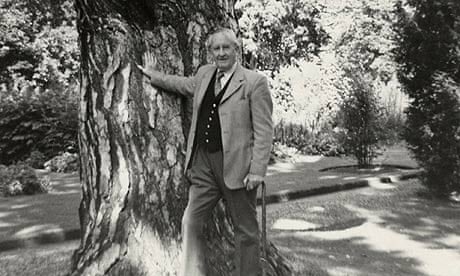The reclusive son of JRR Tolkien has broken his silence to admit fears that fans of his father's work may be "put off" by the verse form of his latest posthumous publication. Responding via fax to a series of questions about The Legend of Sigurd and Gudrún, published for the first time today, Christopher Tolkien expressed the hope that it would show a different side to the author of the much-loved classic The Lord of the Rings.
The 500-stanza poem is closely modelled on the Elder Edda, a collection of Norse myths preserved in a 13th-century manuscript, a pedigree Christopher Tolkien described as "unknown territory" for most people.
"I dare say that a good many will be instantly put off by the very idea of 'long narrative poems in verse' and pursue it no further," he said. It was equally possible that their form will lend them an "unexpected impact," he continued.
"My hope is that some of those who appreciate and admire the works of my father will find it illuminating in respect of Old Norse poetry in general, in his own treatment of the fierce, passionate and mysterious legend, and in this further and little known aspect of him as both philologist and poet. Above all I hope they will take pleasure in this poetry."
Christopher Tolkien, who as a child was paid two pence by his father for every mistake he could find in The Hobbit, and as an RAF pilot during the war contributed suggestions to the progress of The Lord of the Rings, worked from a manuscript which he believes his father wrote in the early 1930s. JRR Tolkien taught Old Norse alongside Anglo-Saxon at Oxford university, giving lectures and classes on Norse language and literature for at least 13 years.
Telling in verse the story of Sigurd the Völsung and the fall of the Niflungs – also adapted by Wagner into the Ring cycle – The Legend of Sigurd and Gudrún sees the hero Sigurd kill the dragon Fafnir (a slaying which may have influenced Tolkien's writing of Bilbo's encounter with Smaug in The Hobbit), take his gold and rescue the Valkyrie Brynhild from her imprisonment on a rock surrounded by fire. Love, magic, jealousy, and, eventually, tragedy in the murder of Sigurd and the suicide of Brynhild ensue.
"My father left one manuscript, and that was complete; there were no more than a few pages of earlier writings, and all other drafting has disappeared. The manuscript is in good clear handwriting, written out without corrections, and obviously intended to be a final fair copy. A few minor changes were made to it much later," said Tolkien, who was appointed as his father's literary executor and has over the past 36 years devoted himself to editing and publishing his father's unpublished works, including The Silmarillion and a 12-volume History of Middle-Earth. "My 'editing' consists very largely of explanation and clarification."
Tolkien, 84, has lived in France since 1975, where wild rumours have suggested that he guards his property from obsessive fans of his father's work with a wild boar – a canard he dismissed as nonsense. "In the full form of the story I keep not one, but a whole troop of wild boars, expressly in order to chase off Tolkien fans who are imagined to lurk in the woods that surround my house," he said. "There are indeed many wild boars in these parts, but I don't think they would be at all suitable as guardians even if I wanted them."
Two years ago Tolkien completed and published his father's unfinished tale of Middle-Earth The Children of Húrin, which went on to sell more than 1m copies in English.
Speculating about what his father, who died in 1973 aged 81, would have made of his immense popularity today – over 150m copies of The Hobbit and The Lord of the Rings have sold worldwide – Tolkien said he "might have been in turns delighted, charmed, amused, puzzled, disquieted, baffled, indignant, but, finally, comprehensively astounded".

Comments (…)
Sign in or create your Guardian account to join the discussion